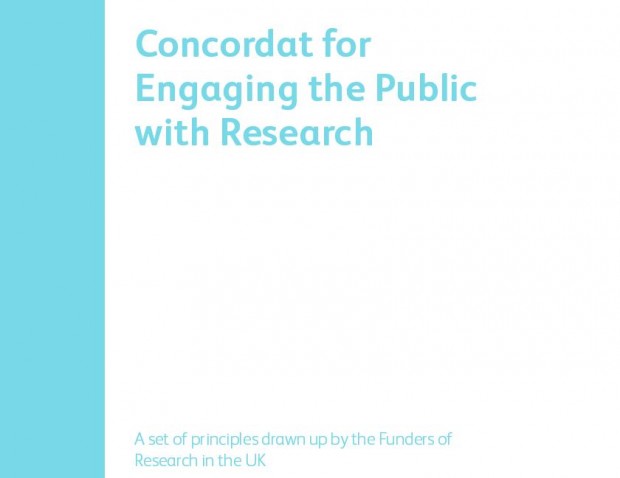Our first case study on the Science and Society Charter comes from Kerry Leslie at Research Councils UK (RCUK) and focuses on their Concordat for Engaging the Public with Research.
Public engagement with research brings major benefits to UK society and economy. Engaging the public with research allows the public’s views to feed into research and future research directions, so that society can share in the benefits of that research. The cutting-edge research taking place within our world class research base is also key to inspiring the next generation of researchers and skilled people, vital to the future prosperity of the UK’. The major UK research funding bodies developed a Concordat for Engaging the Public with Research to provide an unambiguous signal regarding the importance of public engagement with research. The Concordat aims to provide guidance for those who receive funding to better value, recognise and support public engagement and has over 50 signatories and supporters.
UK research funders believe that public engagement enriches the research process and ensures that the results extend beyond, the usual environments of, academia, business and government. It aids researchers in understanding public perceptions, ensuring that their work is relevant and contributes positively to today’s society. This engagement with the public offers greater transparency and accountability of research, and raises society’s awareness and understanding. This serves to empower the public and contributes to the broadening of attitudes. It also inspires further generations to undertake relevant post-16 studies and pursue a career in research. This helps to maintain a constant stream of scientists and researchers, something which is vital to society and to the success of our future economy. For those who do not pursue a career in research, engaging with researchers can help these young people to become more informed citizens. The funders of research in the UK are working together to create a culture where public engagement is regarded as an important and essential activity by the research community.
In 2010, UK funders of research joined together to sign the Concordat for Engaging the Public with Research to help ensure that public engagement is valued, recognised and supported across the research and higher education sectors. The Concordat aims to place greater focus on, and embed public engagement with, research in universities, and other institutions, by providing a single, unambiguous statement clearly outlining expectations and responsibilities. It offers the research and higher education sector a set of principles to support and encourage engagement. It also provides guidance for research organisations, their managers and those researchers responsible for engaging with the public. The Concordat has helped to support institutions and encouraged them to embed public engagement within their mission statements and key strategies, to create senior public engagement champions and to incorporate public engagement into staff policies and processes. This is achieved through four key principles:
- Strategic Commitment: UK research organisations have a strategic commitment to public engagement
- Reward and Recognition: Researchers are recognised and valued for their involvement with public engagement activities
- Skills, Support and Opportunities: Researchers are enabled to participate in public engagement activities through appropriate training, support and opportunities
- Implementation and impact: The signatories and supporters of this Concordat will undertake regular reviews of their and the wider research sector’s progress in fostering public engagement across the UK.
Supported by over 50 signatories and supporters the Concordat demonstrates the strong, widespread commitment to public engagement across the entire sector. The signatories and supporters include the Research Councils UK (which convene the Working Group for the Concordat), the UK higher education funding councils, the Royal Society, British Academy, the Department for Employment and Learning, Department for Environment, Food and Rural Affairs, the Royal Academy of Engineering, and BIS, and implement the Concordat in many ways.
For example, Research Councils UK launched the RCUK Catalyst project in 2012. The project awarded funding to eight universities, for three years, to catalyse culture change within their institution and help them embed public engagement with research within their policies, procedures and practices. The Catalysts grants are transforming the public engagement landscape at these universities. Dedicated public engagement units have been established, senior champions have been created, festivals have flourished, the inclusion of public engagement in promotions criteria for academics has begun and core training and skills development in public engagement, for post-doctoral researchers, now take place at these universities, all as a result of the funding.
The Concordat signatories and supporters continue to support the fostering of public engagement across the UK and worked together to publish Inspiration to engage on the three-year anniversary of the launch. The publication shares inspirational stories of best practice in embedding public engagement and celebrates the achievements in public engagement, by researchers, to help encourage the sector to maintain their commitment to public engagement.
The Concordat has helped support institutions to embed public engagement within their missions and key strategies, to create senior public engagement champions, and to incorporate public engagement into staff policies and processes.
Relevant Links
RCUK Public Engagement with Research
Concordat for Engaging the Public with Research

Leave a comment